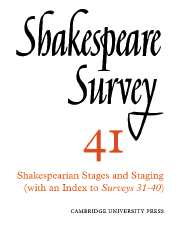Book contents
- Frontmatter
- The Shakespearian Stages, Forty Years On
- The Original Staging of The First Part of the Contention (1594)
- Charles Calvert’s Henry V
- Hamlet, An Apology for Actors, and The Sign of the Globe
- ‘Hid indeed within the centre’: The Hall/Finney Hamlet
- Malvolio and the Dark House
- The Text of Cressida and Every Ticklish Reader: Troilus and Cressida, The Greek Camp Scene
- Antony and Cleopatra, Act 4 Scene 16: ‘A Heavy Sight’
- The Tempest’s Tempest at Blackfriars
- Keats and Lucrece
- The Resources of Characterization in Othello
- Ovid and the Mature Tragedies: Metamorphosis in Othello and King Lear
- The Passing of King Lear
- Shakespeare Performances in London and Stratford-upon-Avon, 1986–7
- Professional Shakespeare Productions in the British Isles, January–December 1986
- The Year's Contributions to Shakespeare Studies: 1 Critical Studies
- 2 Shakespeare’s Life, Times, and Stage
- 3 Editions and Textual Studies
- Books Received
- Index to Volume 41
- General Index to Volumes 31-40
‘Hid indeed within the centre’: The Hall/Finney Hamlet
Published online by Cambridge University Press: 28 March 2007
- Frontmatter
- The Shakespearian Stages, Forty Years On
- The Original Staging of The First Part of the Contention (1594)
- Charles Calvert’s Henry V
- Hamlet, An Apology for Actors, and The Sign of the Globe
- ‘Hid indeed within the centre’: The Hall/Finney Hamlet
- Malvolio and the Dark House
- The Text of Cressida and Every Ticklish Reader: Troilus and Cressida, The Greek Camp Scene
- Antony and Cleopatra, Act 4 Scene 16: ‘A Heavy Sight’
- The Tempest’s Tempest at Blackfriars
- Keats and Lucrece
- The Resources of Characterization in Othello
- Ovid and the Mature Tragedies: Metamorphosis in Othello and King Lear
- The Passing of King Lear
- Shakespeare Performances in London and Stratford-upon-Avon, 1986–7
- Professional Shakespeare Productions in the British Isles, January–December 1986
- The Year's Contributions to Shakespeare Studies: 1 Critical Studies
- 2 Shakespeare’s Life, Times, and Stage
- 3 Editions and Textual Studies
- Books Received
- Index to Volume 41
- General Index to Volumes 31-40
Summary
When Peter Hall assumed the directorship of Stratford’s Memorial Theatre and founded The Royal Shakespeare Company in 1960 he established a bold new direction in the modern staging of Shakespeare. Hall came to Stratford committed to building a permanent ensemble of actors who, through intense training and discipline, could discover a contemporary approach to Shakespeare’s rhetoric. As he explained in his 1964 essay, ‘Shakespeare and the Modern Director’, the core problem centred on Shakespeare’s language and modern assumptions about meaning:
Shakespeare’s language and his form are, of course, foreign to us. Modern actors naturally distrust words. They know them as grey soiled things and, as any politician will tell you, rhetoric is now suspect. Actors also (in a time when the artist’s freedom of self-expression is canonised) resent the disciplines of blank verse or alliterative prose. Techniques have, therefore, to be learnt and developed until Shakespeare’s form is a discipline which supports rather than denies self-expression.
- Type
- Chapter
- Information
- Shakespeare Survey , pp. 45 - 54Publisher: Cambridge University PressPrint publication year: 1989

